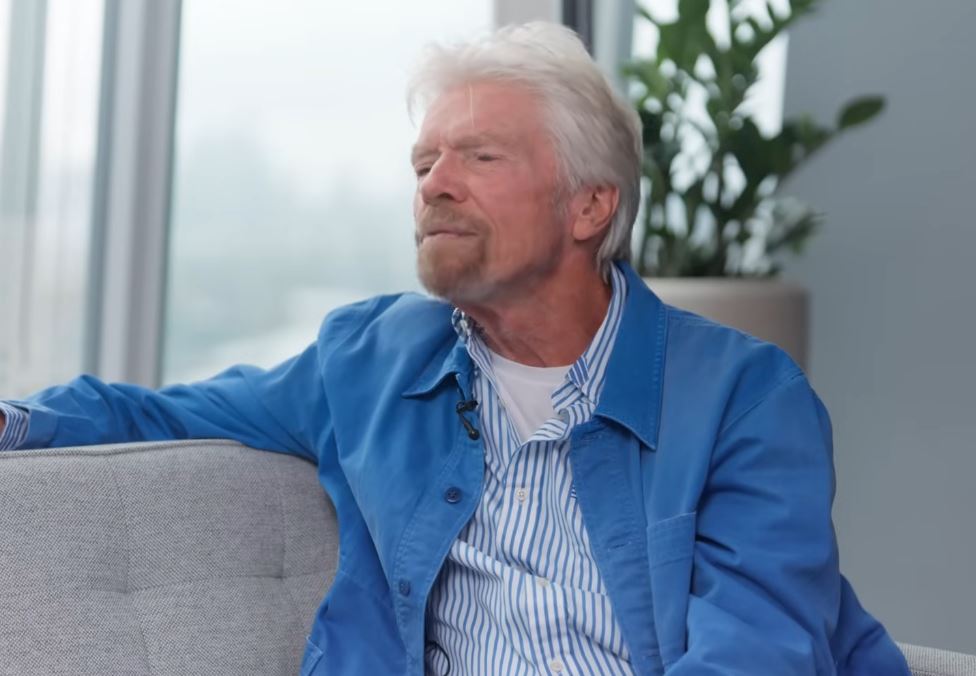
Richard Branson has remarkably defied expectations over the past fifty years, turning unorthodox concepts into well-known brands. He currently has a net worth of $2.8 billion, placing him in the elite category of self-made businessmen whose influence goes well beyond the realm of commerce. His legacy is becoming more and more characterized by his ability to adapt, his personal branding, and his remarkably human approach to innovation, even though he may no longer be at the top of wealth charts.
Branson, who was born in 1950 and was diagnosed with dyslexia, had academic difficulties from an early age. He famously reframed his condition as a different way of thinking, one that would later help him approach problems from new perspectives, rather than viewing it as a limitation. He started Student magazine when he was sixteen, and he used it as a clever way to promote sales of records at a discount. That two-pronged approach was especially creative, demonstrating his natural ability to blend business and culture.
Richard Branson Net Worth
| Attribute | Details |
|---|---|
| Full Name | Sir Richard Charles Nicholas Branson |
| Date of Birth | July 18, 1950 |
| Age | 74 |
| Nationality | British |
| Net Worth (2025) | $2.8 billion USD |
| Key Companies | Virgin Atlantic, Virgin Galactic, Virgin Records, Virgin Hotels |
| First Major Venture | Student Magazine (1966) |
| Residence | Necker Island, British Virgin Islands |
| Marital Status | Married to Joan Templeman |
| Children | Holly Branson, Sam Branson |
| Education | Dropped out of Stowe School |
By the early 1970s, the moniker “Virgin” had surfaced, which alluded to both his team’s inexperience and their untapped potential. Virgin Records was a cultural movement as much as a record label. It provided a stage for musicians like Mike Oldfield and the Sex Pistols, who were deemed too daring or raw by conventional labels. Conviction-driven rather than conformist, Branson swiftly transformed Virgin into the biggest independent record label of its time.
Taking advantage of his early musical success, Branson went into aviation. He saw an opportunity to disrupt commercial air travel in 1984 after personally chartering a plane to save a trip that had been disrupted. That experience gave rise to Virgin Atlantic, an airline with a strong brand ethos, edgy marketing, and surprisingly personal service. Although that endeavor differed greatly from his rivals, it was financially and literally successful.
His business ventures grew quickly over time. Branson’s refusal to focus on a single industry was demonstrated by Virgin Mobile, Virgin Australia, Virgin Trains, and eventually Virgin Galactic. His desire to reinvent himself has been especially advantageous to Virgin’s longevity. Branson’s main business remained strong even when other endeavors faltered, like Virgin Orbit’s demise in 2023.
Branson has maintained his wealth by entering markets where the Virgin brand could still feel bold through strategic licensing and well-timed exits. For example, Virgin Money still attracts attention and makes money; a proposed sale to Nationwide is reportedly worth more than $3.5 billion. These agreements are not only profitable, but they also serve as incredibly clear illustrations of his approach: build, brand, and partner when appropriate.
He made headlines once more in 2021 when he flew with Virgin Galactic. His brief space flight at the age of 70 demonstrated the emotional resonance of his goals. Branson sells experiences rather than just goods. Additionally, he re-establishes for audiences that business can be exciting, even joyful, by using these symbolic gestures.
Crucially, Branson’s impact isn’t solely quantified in monetary terms. He has written several books, such as The Virgin Way and Losing My Virginity, which provide readers with advice on creativity, risk-taking, and resilience in addition to a business playbook. In contrast to tech leaders who are obsessed with data, his approach to entrepreneurship places a strong emphasis on people and storytelling.
Branson piques interest even in his private life. Purchased in 1978 for a mere $180,000, his home on Necker Island has come to symbolize his life: opulent, sometimes ravaged by hurricanes, but always rebuilt with vision. Despite suffering severe injuries while biking in 2016 and witnessing the destruction of his home twice, he remained unfazed. Being able to maintain optimism in the face of hardship is not only admirable, but also incredibly educational.
He has become an ambassador for Ukraine’s United24 initiative and has been vocal about sustainability in recent years, using his platform for activism. These acts demonstrate a markedly better comprehension of business as a social instrument rather than merely an economic engine. He once started Virgin Fuels with the goal of promoting alternative energy in response to the climate crisis. Even though not every one of his ideas works, his willingness to try new things is still very successful.
The disparity in wealth is unavoidably brought to light when Branson is compared to individuals such as Jeff Bezos or Elon Musk. But the point is lost in that gap. Branson’s empire is emotionally compelling, diverse, and incredibly consistent at grabbing the public’s attention. His goal has always been to make markets more interesting and human, not to monopolize them.
Despite the closure of some Virgin ventures, the overall brand is still very adaptable. With growth in the hospitality and space industries anticipated in the upcoming years, Virgin Hotels, Virgin Voyages, and Virgin Galactic are all still doing well. Branson’s emotional intelligence and personal touch provide a remarkable contrast to the increasingly automated nature of capitalism.
